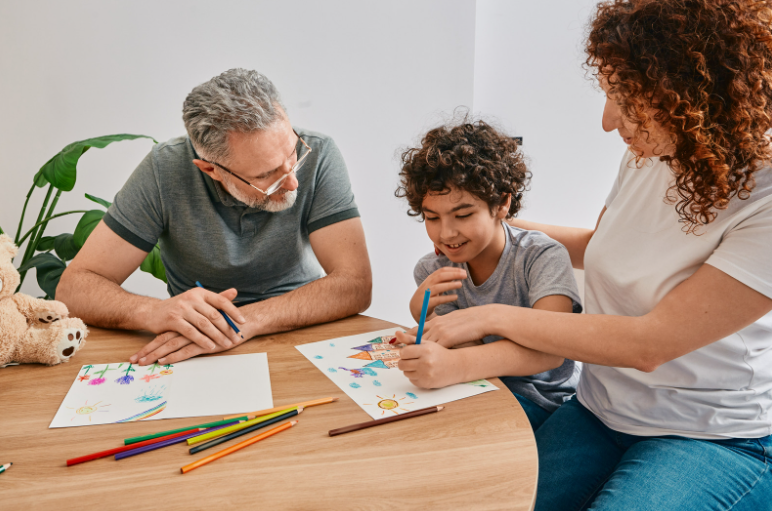We are offering advice to parents, carers and schools on how to have healthy conversations with children if they suspect they are struggling.
Our offering comes at the beginning of Children’s Mental Health Week, to coincide with this year’s theme ‘your voice matters’.
We are encouraging people to give children a voice, speaking to them from an early age about their feelings, so they can understand themselves and their emotional needs.
This is also supported by children and young people's mental health charity ‘Young Minds’, who have reported that talking to a child about how they are, how their day has been and what's on their mind as part of everyday family life shows them that you are interested and want to listen.
Children and Young Person’s Engagement Facilitator, Naomi O’Grady said:
“I have worked with children of all ages for many years and I can’t stress the importance of starting wellbeing conversations early to encourage children to have a voice to share their concerns and what they may be struggling with.
It also helps parents, carers and teachers really get to know the child, meaning they may find it easier to spot the signs if they are finding something difficult to handle.”
This Children’s Mental Health week, Naomi is also offering the following tips on how to have conversations with children:
- Find a safe space for them to open up and remember this may be better away from home, particularly if there are relatives living there. Sometimes doing an activity together offers a good opportunity to start a discussion.
- Ask open questions and avoid the urge to finish their sentences for them if they are finding it hard to put into words how they are feeling.
- You will likely know the young person best; sometimes allowing them to express themselves through art, writing or creative activities may be better than speaking.
- Remember that each child is different and avoid the urge to become overly emotional as they need to feel heard, understood and reassured.
- If the young person becomes really upset, you can change the subject for a bit to take it less intense and then come back to it.
- Use examples of how you or someone you know have come through a similar situation, assuring them that it will be okay and their feelings are perfectly normal.
- Put yourself in their shoes and remember that while society has changed there are added pressures such as social media, you too were once young and probably had struggles of your own.
- Know where to go for support if talking isn’t helping the person.
Naomi added:
“It’s really important to consider the impact of screen and social media time on a child’s mental health as this could be exacerbating or indeed be the cause of the issue they are facing. Doing physical or therapeutic activities together is a good way of keeping them occupied away from phones and computers but also to bond.”
Naomi concluded:
“The vast majority of parents want to do the best for their children and have the added burden of being ‘perfect’, when there is no such thing. Remember that you are only human and will make mistakes.
If your child doesn’t feel they can open up to you, it’s not a failure but it’s important they have elsewhere to go and express themselves, whether it be through someone at school, a youth group or another relative.”
We are also sharing resources to help parents and young people with mental health support:
In crisis situations:
Crisis Line
Available 24/7 on 0800 953 0110
Shout
Available 24/7 by texting SHOUT to 85258
Childline
0800 1111
The Haven in Preston
Is open between 10am to 10pm, with drop-in sessions between 4pm to 6pm. Available by calling 0330 008 3672
Papyrus Hopeline
Call 0800 068 4141 or text 07860 039 967
Self-help online:
Healthy Young Minds
If you live in Lancashire and South Cumbria.
Young Minds
Offering education and advice for mental health conditions, tips on how to have conversations with young people, questions to ask and activities you can do together. They have a section for parents.
Kooth
Offering self-help resources, online messaging and support.
National Bullying Helpline
Support for people being bullied, with advice for parents.
St George’s Academy in Blackpool
Wellbeing support and resources.
Apps
Sleepio
To improve the quality of your sleep
Headspace
Helps with mindful meditation
Catch It
This has is a diary to capture your mood.
For parents:
Young Minds (as above)
A parents’ helpline is available on 0808 802 5544, Monday to Friday between 9:30am and 4pm
Lancashire Positive Minds
Supports families with mental health difficulties.
Family Lives
Parenting and family support

